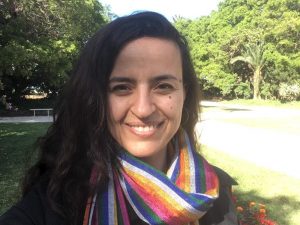Aïda Menouer

BIO
Educated in France and Canada, Aïda Menouer, specialized in painting restoration. Throughout her studies and early career, she experienced various work environments and unbalanced resources. Since 2015, she has worked as a freelance conservator in Algeria, participating in bilateral heritage cooperation projects (UNDP/EU). Her contributions included developing technical documentation to strengthen government institutions. Due to her unique background, several questions emerged regarding professional standards and the importance of international cooperation. Her PhD research focused on identifying optimal equipment and partnerships to establish and sustain a conservation center with limited resources.
Online public thesis defense on September 27th, 2022. 10:00 AM CEST
Supervisor
Eliano Diana
Evaluators
Monica Martelli Castaldi (UNISOB)
Stéphane Ipert (QNL)
Commission Members
Stéphane Ipert (QNL)
Dominique Scalarone (UNITO)
Luca Avataneo (CCR Venaria Reale)
DOCTORAL THESIS RESEARCH TOPIC
The idea of this research emerged in 2018, upon the belief that Algeria was in a pressing need to create a national entity dedicated to conservation and restoration of movable goods.
Since the 1960’s, conservation practices have evolved unevenly worldwide. Many countries still lack conservation training programs and rely on the cohort of students that managed to study abroad or on sporadic international cooperation programs.
When confronted with the need for scientific examination, conservation workplaces have unequal access to the necessary technologies and expertise. This issue questions the standards in the practice of conservation and the level of scientific input and technological instrumentation required for properly conduct conservation activity.
The research aimed to identify the necessary prerequisites for establishing sustainable conservation laboratories and ascertain if the same conservation equipment needs are widespread globally. In this regard, research questions addressed the ontology of heritage conservation as a discipline, international standards, conservation equipment requirements, the impact of cooperation programs in heritage conservation, and the model of a suitable conservation laboratory for Algeria as a conclusive case study.
METHODOLOGY
Because the ultimate motivation for this research was to question the suitability of a central conservation laboratory for Algeria, the research organized investigations into three main axes: the current functioning of conservation laboratories worldwide, the relevance of the widely disseminated National Center Model in the past, and the Algerian context and professionalization level. Various research methods from different domains were employed, including literature review and analysis of archival sources as documentation methods that were driven from the historical paradigm. The evolution of conservation as a discipline, its process of professionalization, and its ties to science and technology have been addressed. This was contrasted to the various organizational structures that have evolved today.
Mixed methods, either quantitative or qualitative, driven from social science were used in the form of interviews (130 informants from 11 different countries), online survey (619 respondents originating from 87 countries) and onsite in person visits. Comparative analyses were conducted on multicultural international cooperation initiatives (Italy/ Serbia, Japan/ Egypt, USA/ Iraq) and on case studies of conservation laboratory designs, observed at the 31 various visited workplaces located in the north Mediterranean (Spain, France, Italy). Eventually a feasibility study was undertaken for the possible implementation of a laboratory in Algeria.
These methods allowed for collecting feedbacks from the field about past experiences and current trends in conservation activity, according to workplace type and users’ profiles.
OUTCOME
The outcome of the research validates the implementation of a potential laboratory in Algeria, which can be applicable to any initiative aiming to create a dedicated structure for the conservation of cultural heritage. This structure would provide standardized access to high quality imagery, scientific investigations, material analysis, alongside with effective and practical work procedures, and secured work environments. In the perspective of a rational implementation of conservation workplaces, a set of general recommendations for the sustainable use of scientific instrumentation is given in conclusion. Five typologies of workplaces emerged from the 31 observation visits, reflecting their cumulative activities: service-oriented workplaces, those combining research with one or two services, those including educational activities, and institutes offering a full range of services.
Exploring the concepts of durability and sustainability, the research results provide orientations on how a standardized and dynamic conservation workplace can be maintained, especially when faced with outdated technologies and the lack of human resources. Feedback from the field highlights best practices as well as less successful initiatives and provides alternative strategies that have been developed to counter equipment accessibility issues.
Presentation at the AIC (American Institute of Conservation) 50th Annual Meeting Conference, May 15th, 2022. In press: RATS Postprints 2022.
Menouer Aïda, Hénaut Léonie, “Current International Trends in the Use of Instrumental Analysis and Scientific Equipment in Conservation Practice and Research”, in: Research and Technical Studies Specialty Group of the American Institute for Conservation. 2022
Paper contribution
MENOUER Aïda, «De la théorie à la pratique: la prépondérance d’un choix dans l’intervention en conservation-restauration », in : Ikosim n°10, Algiers, 2021, pp.109-126
Tech4Culture Fellow – Call 1 (2018)
Supervisor: Eliano Diana, Department of Chemestry, UniTO
Keywords:
Conservation Science, Conservation Laboratory Design, International cooperation, Sustainability, Scientific instruments, Conservation equipment, Professionalization, Workplace, Online Survey, Feasibility study, Algeria.
